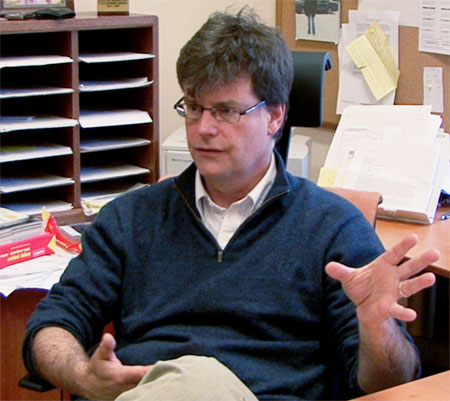complicación versus seudocomplejidad y complejidad es tratado por los ecofilófos noruegos en un precioso libro sobre open air wisdom...
complejidad es la característica básica de cualquier sistema, cuando es mirado sin cortes ni demasiadas raspaduras...
seudocomplejidad es cuando a la complejidad intentamos SIMULARLA en un parque de atracciones o temático, un centro comercial.... experimento laboratorial, etc...
complicación es el cotidiano aburrimiento de redundancias en nuestra vida, ej.- atascos de coshes, de letras como esta, de alumnos adocenados jeráquica e inmovilizada-mente...
COLOCO AQUI ESTO que en ese blog nanai
SimBioDiversidad
Loh Bayeh zon Tetah Yenah de Amoroza Leshe que nos nutreh en esta la Máh PrimorRoza Primaberrra en loh Menoh zien (eng)años es un útero en el que somos continente y contenido
jueves 25 de junio de 2009
THE SIMPLIFIER: qué guay! Simplificar
We discovered a new vein of research — the relation between physical and social or psychological concepts — that we came to by taking evolutionary principles seriously and applying them to psychology. We weren't using evolutionary psychology, which has largely been focused on mating and reproduction. Our focus, rather, was in terms of evolutionary biology and the basic principles of natural selection: and that field makes clear that humans must have had these kinds of mechanisms or these processes to guide our behavior prior to evolution or emergence of consciousness.
THE SIMPLIFIER
A Conversation with John A. Bargh

![]()
Introduction
"They say that in science there are complicators and there are simplifiers," says John Bargh, Yale social psychologist known for his early work on the topic of automaticity, and more recently for bringing experimental methodology to the philosophical question of free will.
According to Bargh, the tension between the complicators and the simplifiers is a good thing in any field of ideas or science. "I've always been a simplifier." he says, "looking for the simple mechanisms that produce complex effect, instead of building a complicated model. Once we find one of these veins — one of these avenues of research — we just go for it and mine it and mine it until we run out of gold.
Bargh's lines of research all focus on unconscious mechanisms that underlie social perception, evaluation and preferences, and motivation and goal pursuit in realistic and complex social environments. That each of these basic psychological phenomena occur without the person's intention and awareness, yet have such strong effects on the person's decisions and behavior, has considerable implications for philosophical matters such as free will, and the nature and purpose of consciousness itself.
He maintains that the resulting findings "are very consistent and in harmony with evolutionary biology. And this is very unlike psychology, which has always presumed a kind of consciousness bottle-neck or a self, some kind of a homunculus type of self sitting there, making all the decisions and deciding without any explanation of where they comes from or what's causing the self or what's causing the conscious choices. Emphasizing what our unconscious systems do for us, in turn, links us very strongly to other organisms and other animals very closely. Recent primate research is showing that primates are closer to us than we thought. They fall for the same kind of economic fallacies that Kahneman and Tversky talked about in humans 30 years ago."
— Russell Weinberger
Associate Publisher, Edge
JOHN A. BARGH is professor of social psychology at Yale University and director of the ACME (Automaticity in Cognition, Motivation and Evaluation) Lab.
Archivo del blog
- ▼ 2009 (200)
- ▼ junio (39)
- THE SIMPLIFIER: qué guay! Simplificar
- The Universe is fundamentally a Quantum Computer
- Zero Knowledge In Our Quantum Future
- Revelator’s Complex Adaptive Reasoning Methodology...
- P3P: People-and-the-Three-Paradise-System
- Matematicas y Polimatia
- Infimonikal System in SILObreaker
- Zangaya cards (2 de 2)
- Zangaya cards (1 de 2)
- Pubys Inclusive Science (Pys-8)
- Pubys Inclusive Science (Pys-7)
- Pubys Inclusive Science (Pys-6)
- Pubys Inclusive Science (Pys-5)
- Pubys Inclusive Science (Pys-4)
- Pubys Inclusive Science (Pys-3)
- Pubys Inclusive Science (Pys-2)
- Pubys Inclusive Science (Pys-1)
- Pubys Inclusive Science (Pys-0)
- ...pero estamos mal
- Vamos bien...
- La Web Resultados 1 - 10 de aproximadamente 386.00...
- La Web Resultados 1 - 10 de aproximadamente 484.00...
- La final Del ChamPiyoneato
- Zotero: Instant Science pubication
- La Web Resultados 1 - 10 de aproximadamente 2.450....
- La Web Resultados 1 - 10 de aproximadamente 5.040....
- La Web Resultados 1 - 10 de aproximadamente 13.250...
- Asociación de amigos del Kilómetro (cero)
- Eficiency in Sharing Knowledge has over passed Sys...
- paquiyo, ers un mostruo colega
- La Web Resultados 1 - 10 de aproximadamente 775.00...
- quien es John Boorman, Quetepillo Pillíno
- La Web Su búsqueda - zangayate ya! - no produjo ni...
- ¡Hola!
- building a new specialization
- Integration and Implementation Sciences
- 1 - 3 de 3 de "the google's mind"
- CONTEST “LIBERTARIAN PEDAGOGY”
- Infimonikal System: The Google's Mind
- ► mayo (16)
- ¿quien traduce al urdu?
- ¿aún lejana?
- ¿Pero es que hay ciencia alguna que no sea global?...
- simbiodiversidad vs. ciencia global
- Sensosfera vs. simbiodiversidad
- symbiodiversity in Free dictionary
- Simbiodiversidad vs. biodiversidad
- La Fuerza del anonimato
- ¡Qué poco inclusivo es el lenguaje "inclusivo"! La...
- 1. Inference: Abduction, Induction, Deduction E...
- Resultados 1 - 10 de aproximadamente 4.640.000 de...
- ▼ junio (39)
- ► 2008 (71)
- ► septiembre (1)

0 comentarios:
Publicar un comentario en la entrada
Enlaces a esta entrada
Crear un enlace